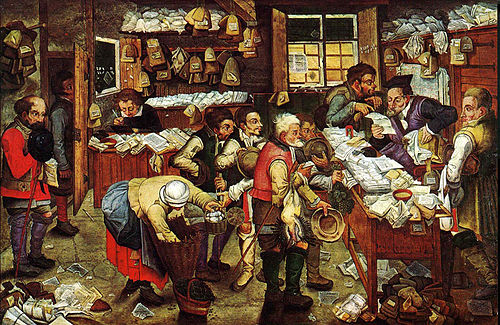Taxnoun
Money paid to the government other than for transaction-specific goods and services.
Taxnoun
A burdensome demand.
Taxnoun
A task exacted from one who is under control; a contribution or service, the rendering of which is imposed upon a subject.
Taxnoun
(obsolete) charge; censure
Taxnoun
(obsolete) A lesson to be learned.
Taxverb
(transitive) To impose and collect a tax from (a person).
Taxverb
(transitive) To impose and collect a tax on (something).
Taxverb
(transitive) To make excessive demands on.
Taxnoun
A charge, especially a pecuniary burden which is imposed by authority.
Taxnoun
A charge or burden laid upon persons or property for the support of a government.
Taxnoun
A task exacted from one who is under control; a contribution or service, the rendering of which is imposed upon a subject.
Taxnoun
Especially, the sum laid upon specific things, as upon polls, lands, houses, income, etc.; as, a land tax; a window tax; a tax on carriages, and the like.
Taxnoun
A disagreeable or burdensome duty or charge; as, a heavy tax on time or health.
Taxnoun
A sum imposed or levied upon the members of a society to defray its expenses.
Taxnoun
Charge; censure.
Taxnoun
A lesson to be learned; a task.
Taxverb
To subject to the payment of a tax or taxes; to impose a tax upon; to lay a burden upon; especially, to exact money from for the support of government.
Taxverb
To assess, fix, or determine judicially, the amount of; as, to tax the cost of an action in court.
Taxverb
To charge; to accuse; also, to censure; - often followed by with, rarely by of before an indirect object; as, to tax a man with pride.
Taxnoun
charge against a citizen's person or property or activity for the support of government
Taxverb
levy a tax on;
Taxverb
set or determine the amount of (a payment such as a fine)
Taxverb
use to the limit;
Taxverb
make a charge against or accuse;
Taxnoun
a compulsory contribution to state revenue, levied by the government on workers' income and business profits, or added to the cost of some goods, services, and transactions
Taxnoun
a strain or heavy demand
Taxverb
impose a tax on (someone or something)
Taxverb
pay tax on (something, especially a vehicle)
Taxverb
make heavy demands on (someone's powers or resources)
Taxverb
confront (someone) with a fault or wrongdoing
Taxverb
examine and assess (the costs of a case)
Tax
A tax is a compulsory financial charge or some other type of levy imposed on a taxpayer (an individual or legal entity) by a governmental organization in order to fund government spending and various public expenditures. A failure to pay, along with evasion of or resistance to taxation, is punishable by law.
Tithenoun
(archaic) A tenth.
Tithenoun
(historical) The tenth part of the increase arising from the profits of land and stock, allotted to the clergy for their support, as in England, or devoted to religious or charitable uses. Almost all the tithes of England and Wales are commuted by law into rent charges. The concept originates in the Hebrew Scriptures (Old Testament).
Tithenoun
A contribution to one's religious community or congregation of worship (notably to the LDS church)
Tithenoun
A small part or proportion.
Tithenoun
(obsolete) A boon a grant or concession.
Titheadjective
(archaic) Tenth.
Titheadjective
(obsolete) Receiving a concession or grant; successful in prayer or request.
Titheverb
To give one-tenth or a tithe of something, particularly:
Titheverb
(transitive) To pay something as a tithe.
Titheverb
(transitive) To pay a tithe upon something.
Titheverb
(intransitive) To pay a tithe; to pay a 10% tax
Titheverb
To pay or offer as a levy in the manner of a tithe or religious tax.
Titheverb
To take one-tenth or a tithe of something, particularly:
Titheverb
(transitive) To impose a tithe upon someone or something.
Titheverb
(transitive) To spare only every tenth person, killing the rest (usually in relation to the sacking of the episcopal seat at Canterbury by the pagan Danes in 1011).
Titheverb
(transitive) To enforce or collect a tithe upon someone or something.
Titheverb
To decimate: to kill every tenth person, usually as a military punishment.
Titheverb
(intransitive) To enforce or collect a tithe.
Titheverb
To compose the tenth part of something.
Titheverb
To grant, concede.
Tithenoun
A tenth; the tenth part of anything; specifically, the tenthpart of the increase arising from the profits of land and stock, allotted to the clergy for their support, as in England, or devoted to religious or charitable uses. Almost all the tithes of England and Wales are commuted by law into rent charges.
Tithenoun
Hence, a small part or proportion.
Titheadjective
Tenth.
Titheverb
To levy a tenth part on; to tax to the amount of a tenth; to pay tithes on.
Titheverb
Tp pay tithes.
Tithenoun
a levy of one tenth of something
Tithenoun
an offering of a tenth part of some personal income
Titheverb
exact a tithe from;
Titheverb
levy a tithe on (produce or a crop);
Titheverb
pay one tenth of; pay tithes on, especially to the church;
Titheverb
pay a tenth of one's income, especially to the church;
Tithenoun
one tenth of annual produce or earnings, formerly taken as a tax for the support of the Church and clergy.
Tithenoun
(in certain religious denominations) a tenth of an individual's income pledged to the Church.
Tithenoun
a tenth of a specified thing
Titheverb
pay or give as a tithe
Titheverb
subject to a tax of one tenth of income or produce.
Tithe
A tithe (; from Old English: teogoþa ) is a one-tenth part of something, paid as a contribution to a religious organization or compulsory tax to government. Today, tithes are normally voluntary and paid in cash or cheques, whereas historically tithes were required and paid in kind, such as agricultural produce.







